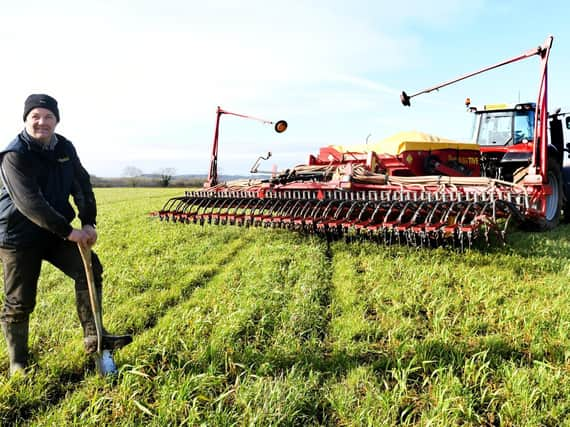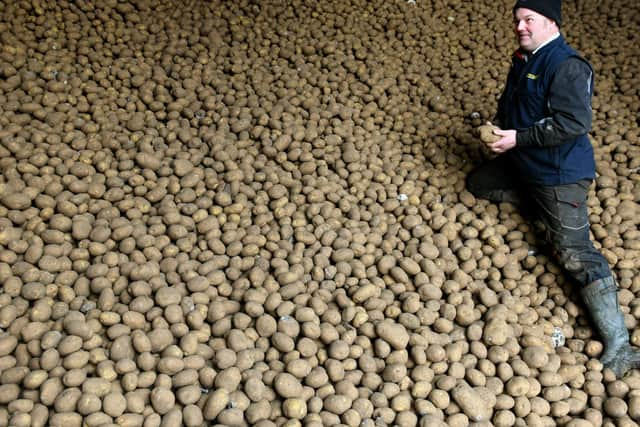Farm of the Week: Pioneering sustainable farming and countryside stewardship near the Castle Howard estate


North Yorkshire arable farmer Andrew Wilson has altered the type of crops and the rotation they are grown in at Brickyard Farm, Slingsby with encouraging results.
Potatoes, sugar beet and cereal crops continue to form the cornerstone of the farm business that includes 330 acres tenanted from Castle Howard, 70 acres owned, 250 acres rented for potatoes on one-year lets and 300 acres where he provides a stubble-to-stubble arrangement for two local farmers.
Advertisement
Hide AdAdvertisement
Hide AdAndrew, his wife Elizabeth and his mother Ann make up the family partnership that included his father Chris until he passed away in 2018. Andrew acknowledged the huge part he played in his life.


“Dad was my inspiration and my work ethic comes from him,” said Andrew.
“I’m one of those people who has always known exactly what I was going to do and we always respected each other.
“When Dad came here his was a lifetime tenancy and I became joint tenant in 2006. He ran a successful haulage business as well as farming, while I concentrated my efforts on the farm.”
Advertisement
Hide AdAdvertisement
Hide AdAndrew constantly analyses performance of crops and crop varieties and has made many alterations in the past decade.
“For me farming is all about looking to see if something is not working and how you can make it better. We used to be conventional arable farmers, growing wheat, barley and oilseed rape, but now we pay greater attention to our soil quality and it is slowly improving.
“I’ve found growing spring oats, beans and cover crops quite encouraging and a much better fit. The oats also create additional straw for our pigs."
Andrew said the farm, which has been in stewardship for the past 25 years, has “challenging” heavy wet clay to the north and sandy clay loam to the south.
Advertisement
Hide AdAdvertisement
Hide Ad“On the heavier side our rotation is two winter wheats, winter beans, two winter wheats, then a cover crop before spring milling oats.”
Andrew said they made the decision to stop growing oilseed rape in 2010, starting the beans and cover crops in 2011.
“We started direct drilling the beans because we were on sticky wet land and it was as much to enable a smooth ride with the sprayer and combine, but the beans being direct drilled also certainly improved our soil condition.
“We put in spring oats in 2013 after a ridiculously wet year. They are low input and keep the nitrogen requirement down. We put on muck one year in six, before the cover crop.”
Advertisement
Hide AdAdvertisement
Hide AdAndrew said his lighter land crop rotation is potatoes, winter wheat, winter barley, a cover crop and then sugar beet, seed oats, winter wheat, spring barley, potatoes, sometimes beans and winter wheat, with constant re-evaluation of what works best.
Over the past two years, Andrew has also been involved with AHDB farm business groups, which he said “focuses the mind”. He recently gave a presentation which “illustrated the journey” with cover crops and how the farm is now saving on establishment and cultivation.
“One of my neighbouring farmers told me he was watching what I was doing, and said he couldn’t work out whether I was a genius or a nutcase.”
Potatoes remain Andrew’s biggest crop and he said today’s trading is very different compared to just a few years ago.
Advertisement
Hide AdAdvertisement
Hide Ad“We grow 250 acres of potatoes with half going to McCain, those are the Innovator and Royal varieties and the other half to crisp factories at Seabrook, Tayto and Walkers using the varieties Brooke, Pirol, Opal and Triple 7.
“We like to average around 20 tonnes per acre and study results closely. If a variety is underperforming we drop it.
“We were taking the crop straight from field to factory, but we found it doesn’t cut it, so we have now invested in ambient storage facilities to house all our potatoes.”
Andrew said the family has a strong track record in growing sugar beet and he is looking at how to maintain the crop as well as help the bee population.
Advertisement
Hide AdAdvertisement
Hide Ad“Sugar beet was my father’s favourite crop and it has always been a good, reliable performer. We are now, so far as I’m aware, one of few to have an unbroken annual record of growing it since the early York factory sudays and since we began supplying Newark in 2007.”
The rest of this year’s cropping is 100 acres of winter wheat with the feed varieties Costello, Skyscraper and Evolution that usually average between 4 to 4.5 tonnes per acre; 70 acres of winter barley that averages 3.25 to 3.5 tonnes and is also grown for the straw; 35 acres of winter beans; 50 acres of spring malting barley; 25 acres of seed oats and 35 acres of milling oats. Andrew said seed oats follow sugar beet on the lighter land.
“As a rule our cover crops are grown before a spring crop and we use muck before a roots crop.”
Cover crops include mustards, radish, oats, vetch and beans with Andrew growing low input grass for hay.
Advertisement
Hide AdAdvertisement
Hide AdAs well as his role in the foundation of Future Farmers Andrew has also been a member of Amotherby Young Farmers Club and chair of the Yorkshire Federation of Young Farmers’ Clubs.
“A farmer once said to me, ‘get out of farm gate and learn summat, or you’ll stop at home, ‘til you know nowt’. That was my driver for joining Young Farmers and then Future Farmers.
“Future Farmers of Yorkshire is an invaluable organisation. It develops your experience with like-minded people following on after young farmers and we are also incredibly fortunate to have administrator Liz Hudson’s infectious enthusiasm.”
Comment Guidelines
National World encourages reader discussion on our stories. User feedback, insights and back-and-forth exchanges add a rich layer of context to reporting. Please review our Community Guidelines before commenting.